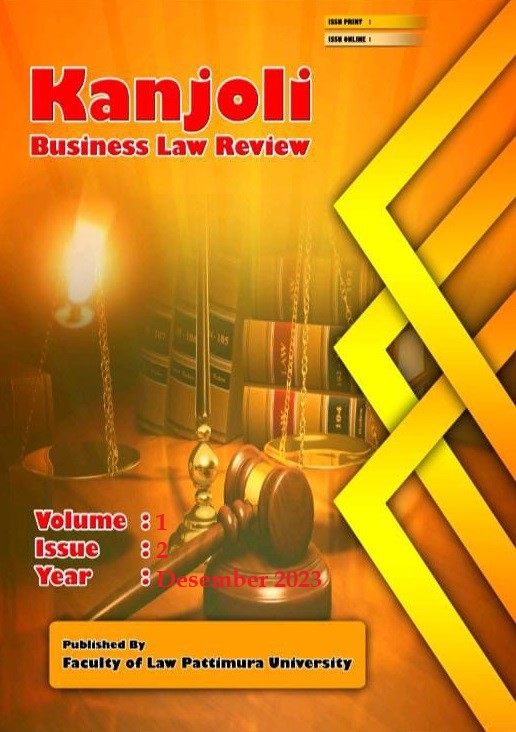Perlindungan Hak Ekonomi Pencipta Dan Pemegang Hak Cipta Atas Pemutaran Musik Atau Lagu Di Kafe Dan Restoran
Abstract
Commercially playing music or songs in cafes and restaurants by these business actors are required to pay royalties as regulated in Government Regulation No. 56 of 2021. However, quite a few business actors are still currently refusing and not paying royalties for certain reasons, This act of not paying royalties of course violates the exclusive rights in the form of economic rights of the creator or copyright holder and causes economic losses for the creator or copyright holder. This research uses a normative juridical research method with the legal materials used, namely primary legal materials, secondary legal materials and tertiary legal materials. Data collection techniques were carried out through literature study and analyzed using qualitative methods to answer the problems in this research. The results of this research can be concluded that business actors who play music or songs commercially in cafes and restaurants and do not pay royalties have violated the economic rights of creators and copyright holders. The legal consequences of violations of economic rights, as regulated in Government Regulation No. 56 of 2021 and Law No. 28 of 2014, are that creators or copyright holders can file lawsuits and can be subject to compensation fines or imprisonment for business actors who do not pay royalties. It is necessary to expand the reach of LMKN and improve infrastructure so that it can reach small areas, as well as for creators to be able to immediately register their creations to make it easier for LMKN to manage royalties and avoid Copyright violations and to make it easier to resolve problems related to Copyright.
Downloads
References
Asri, Dyah Permata Budi. “Perlindungan Hukum Preventif Terhadap Ekspresi Budaya Tradisional Di Daerah Istimewa Yogyakarta Berdasarkan Undang-Undang Nomor 28 Tahun 2014 Tentang Hak Cipta.” JIPRO: Journal of Intellectual Property, 2018, 13–23. https://doi.org/10.20885/jipro.vol1.iss1.art2.
Berlianty, Teng, Agustina Balik, and Ronald Fadly Sopamena. “Meningkatkan Pemahaman Masyarakat Atas Hak-Hak Konsumen.” AIWADTHU: Jurnal Pengabdian Hukum 2, no. 1 (2022): 35–41.
Direktorat Jendral Hak Kekayaan Intelektual Kementrian Hukum Dan Hak Asasi Manusia R.I.,. Buku Panduan Hak Kekayaan Intelektual. Tangerang, 2013.
Djumhana, Muhamad, and R Djubaedillah. Hak Milik Intelektual : Sejarah, Teori Dan Prakteknya Di Indonesia. Bandung: Citra Aditya Bakti, 2014.
Manek, Adrianus Rudiyance Gilberto, and Betty Dina Lambok. “IMPLEMENTASI HAK EKONOMI PENCIPTA LAGU OLEH WAHANA MUSIK INDONESIA (WAMI).” Hukum Responsif 10, no. 1 (February 28, 2019). https://doi.org/10.33603/responsif.v10i1.5053.
MR, Jenderal Louis. “Soal Live Music Wajib Bayar Royalti, ini Tanggapan Pengelola Cafe di Kota Musik Dunia,” April 8, 2021. https://ambon.tribunnews.com/2021/04/08/soal-live-music-wajib-bayar-royalti-ini-tanggapan-pengelola-cafe-di-kota-musik-dunia.
Says, Jaz. “PENDEKATAN PERUNDANG-UNDANGAN (STATUTE APPROACH) DALAM PENELITIAN HUKUM | Saiful Anam & Partners,” December 28, 2017. https://www.saplaw.top/pendekatan-perundang-undangan-statute-approach-dalam-penelitian-hukum/.
Sutrahitu, Martha Elizabeth, Sarah Selfina Kuahaty, and Agustina Balik. “Perlindungan Hukum Pemegang Hak Cipta Terhadap Pelanggaran Melalui Aplikasi Telegram.” Tatohi: Jurnal Ilmu Hukum 1, no. 4 (2021): 346–55.
Copyright (c) 2023 Reylandho Cornelius Talahatu, Teng Berlianty, Agustina Balik (Author)

This work is licensed under a Creative Commons Attribution-NonCommercial 4.0 International License.
Authors who publish their manuscripts in this Journal agree to the following conditions:
- The copyright in each article belongs to the author, as well as the right to patent.
- Authors are able to enter into separate, additional contractual arrangements for the non-exclusive distribution of the journal's published version of the work (e.g., post it to an institutional repository or publish it in a book), with an acknowledgment of its initial publication in this journal.
- Authors are permitted and encouraged to post their work online (e.g., in institutional repositories or on their website) prior to and during the submission process, as it can lead to productive exchanges, as well as earlier and greater citation of published work.
- Authors have the right to self-archiving of the article (Author Self-Archiving Policy)











